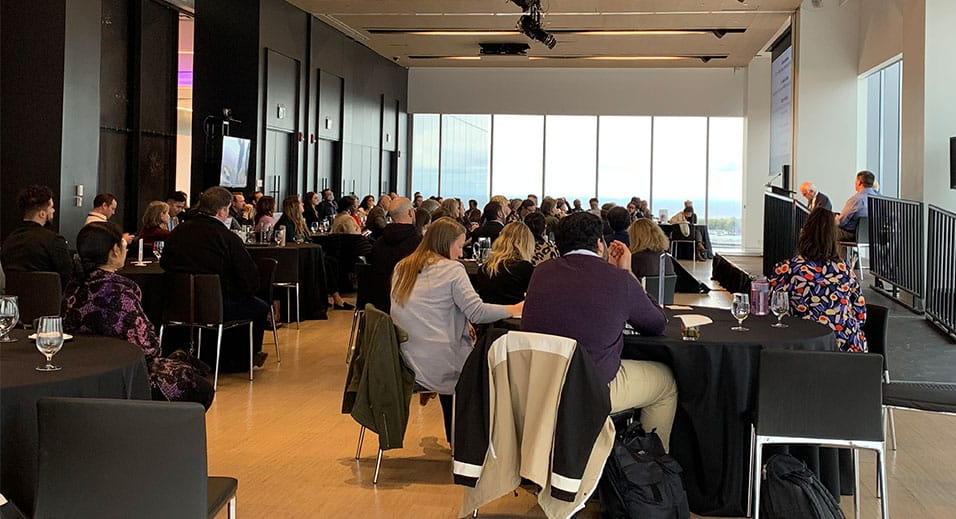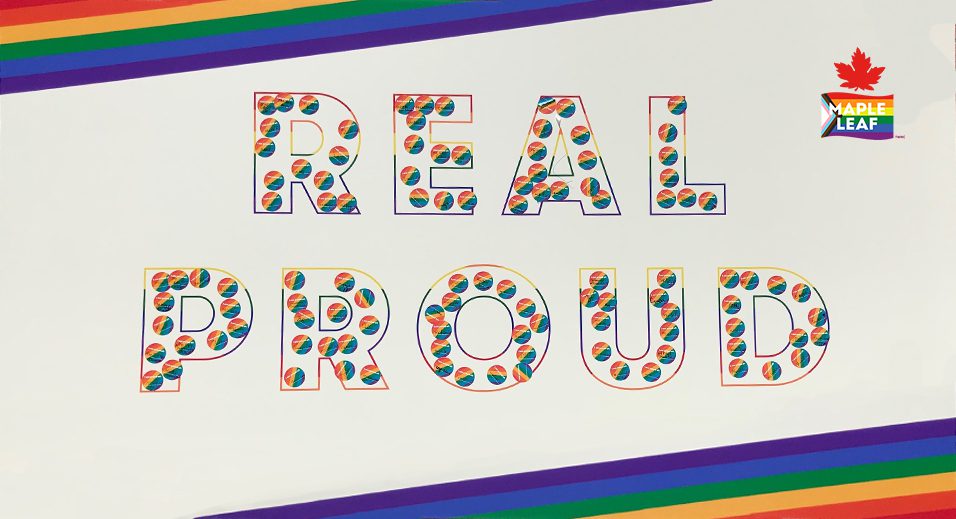We need to accelerate action to reduce food insecurity in Canada.
By Sarah Stern, Director of The Maple Leaf Centre for Food Security
On October 18, we hosted our annual Food Security Symposium, bringing together attendees from across the country. This, our 3rd annual event, was initially scheduled for May 2020 and was one of the very first things that we cancelled with the onset of the COVID-19 pandemic in March of that year. Never did I think it would be 2.5 years before we got back to this.
A lot happened in that time. There was a growing awareness of food insecurity and the impossible choices that too many face to access food. And the sad reality that food insecurity is getting worse. Before the start of COVID, Daily Bread Food Bank supported around 60,000 people on a monthly basis. Last month, just 2.5 years later, 182,000 clients are using their services. And they’re signing up new clients at rates they’ve never seen before. Nearly 9,000 families registered to use their food banks for the very first time just last month.
We know that only about a quarter of people who are food insecure go to food banks — but food bank visits are a leading indicator that suggests that numbers are rising.
The Symposium brought together more than 130 people from across sectors to share and explore what we can do to accelerate action to reduce food insecurity in Canada.
A global perspective on food insecurity
We kicked off the day with Dr. David Nabarro, Former Special Advisor to the UN on the 2030 Agenda for Sustainable Development & Climate Change and Co-Lead of the food workstream of the UN Global Crisis Response Group who shared a global perspective. He spoke about the work taking place as a result of the UN Food Systems Summit and highlighted that we must look after those who are poor and hungry — they need our support the most.
He then narrowed in on Canada: “This is a nation that stands for leaving no one behind — that’s what Canadians are all about,” said David. “Millions of poorer households are at risk of sliding into poverty because of increased costs of living and reduced purchasing power.”
The cost-of-living crisis became a recurring theme of the day — in a world where goods and necessities are skyrocketing in value, many are falling behind, especially those who live near or below the poverty line. Too many people are being forced to make the decision between eating and paying the bills.
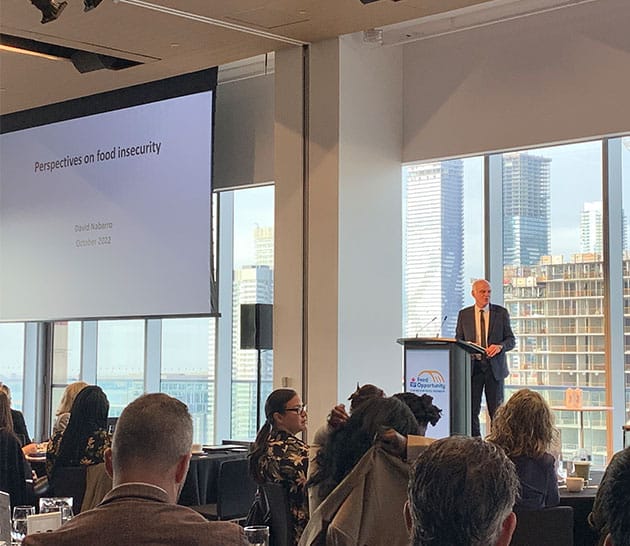

Confronting barriers to food security
There are many different things that get in the way of access to nutritious, culturally appropriate food. Lack of money to buy food is the single greatest cause of food insecurity and can stem from insufficient or unstable income, barriers to employment, or high costs of living. Food insecurity can also be impacted by remote geography, health status, access to social supports or knowledge, and structural racism.
We aimed to ground the audience in the experience of barriers to food security and what strengths, assets, and supports are helpful in confronting those barriers. Moderator Jaya James, Executive Director of Hope House, was joined by guests Erin Beagle, Executive Director of Roots Community Food Centre, Rafia Haniff-Cleofas, National Director of Race and Disability Canada, and Gordie Liske, Hunter & Trapper at Dechinta Centre for Research and Learning.
In her opening reflection, Jaya noted that “If you’re focused on getting your necessities, there isn’t much energy left to focus on food,” for those living in food insecure households that are struggling to get by. And despite being employed, “a job is not always enough sometimes,” said Erin. “The pressures on people we work with, it’s pulling them in all different directions.”
Gordie shared that opportunity and the challenges of accessing country foods and Rafia shared stories and the staggering statistics about living with disabilities; “Nearly one quarter of disabled people are living in poverty, that’s roughly 1.5 million people, according to 2017 Statistics Canada report. And 50% of Canadians who struggle with food insecurity have a disability.”
Rafia noted that barriers for people with disabilities include being low income and living in poverty, high costs related to being disabled, accessibility, racism, and systemic discrimination. We must fight to ensure those with disabilities can still put food on the table every day.
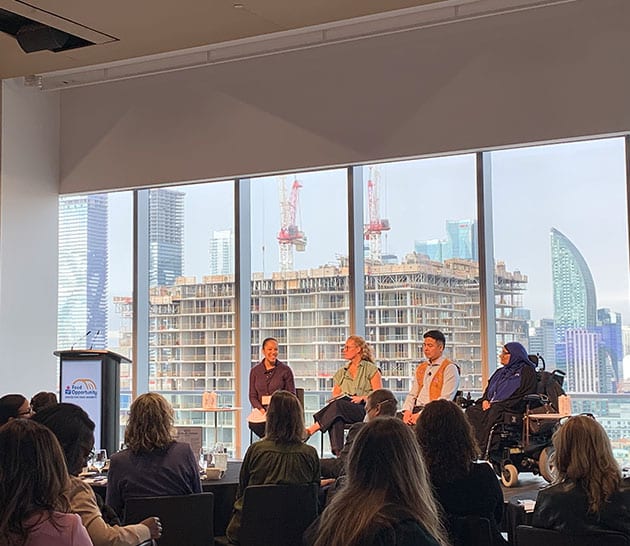

Social determinants of health and food insecurity
In a presentation covering the social determinants of health related to food insecurity, Dr. Andrew Boozary, Executive Director of UHN Gattuso Centre for Social Medicine, highlighted that food insecurity is a problem of inadequate income, and cannot be solved by food.
“It’s not just the social determinants of health, it’s the moral determinants of health,” said Andrew on addressing social issues as a crucial basis for improving health outcomes.
“To understand social determinants of food security, we have to acknowledge the persistent impacts of systemic racism and discrimination on individual health outcomes.”
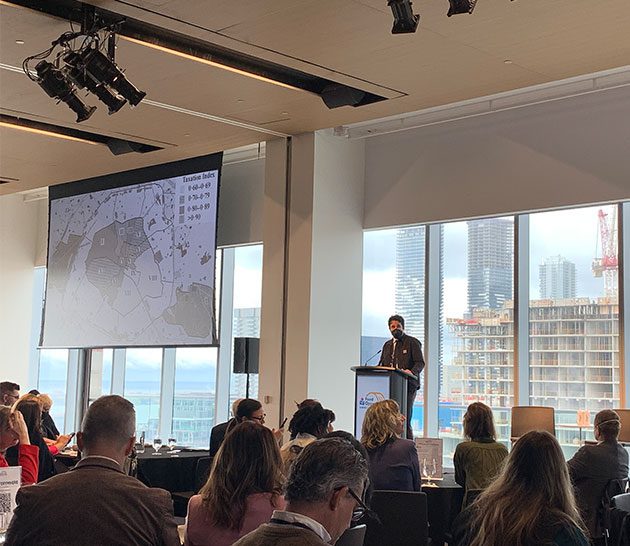

Please keep posted for an additional reflection on our learnings and insights from the Food Security Symposium!
